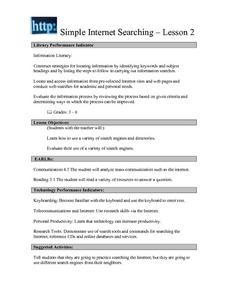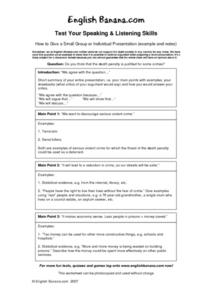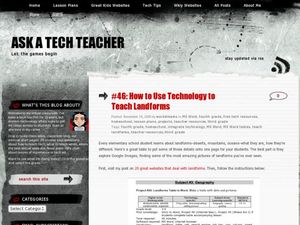Computer Science Unplugged
Kid Krypto–Public-Key Encryption
Class members have an opportunity to experience how to use a public key to encrypt information and a private key to decrypt it. Groups create their own public key and encrypt information then develop private keys to decrypt this...
Twin Cities Medical Society
Should I Talk to My Kids about Vaping?
Enlist parents and guardians in an anti-vaping campaign with an infographic that offers suggestions for how to talk with their students about e-cigarettes and e-liquids. The visual includes information about the dangers of vaping as well...
Curated OER
The Statue of Liberty: The Meaning and Use of a National Symbol
Engage your class in a series of activities, each related to the use or analysis of symbols used to convey patriotic or national concepts. They identify different national symbols and explain their meanings, discussing the importance of...
Code.org
HTTP and Abstraction on the Internet
Introduce your class to the layers of abstraction of the Internet with a lesson plan on the HTTP protocol. Pupils review previous lessons on levels of the Internet, then investigate new high levels by examining the HTTP traffic on their...
Curated OER
Geography Project: Australia
A presentation packed with project ideas and research questions encourages viewers to use images to describe Australia's climate, leisure activities, location, interesting facts, culture, and landmarks. Learners combine technology and...
Curated OER
Animal Adaptations
Young scientists explore the animal kingdom from the safety of the classroom with this short research project. After first choosing an animal, children use the Internet to discover where it lives, what it eats, and how it has adapted to...
Curated Video
Online Reputation and Cyber-bullying
Combat cyberbullying with information. During this plan, learners watch a couple of videos, consider online behavior scenarios, brainstorm long- and short-term consequences, and discuss how to react to bullying in order to build up to...
Google
Better Searches. Better Results.
Show your researchers how to get better results when using a search engine to find information with a template that models 10 search strategies. The suggestions explain what to type, what the search engines does, and what results users...
Curated OER
Cartoons for the Classroom: Media Industry and the Internet
Kids take a good look at what the Internet has done to "old media" industries, such as newspapers, magazines, and books. They analyze the editorial comments made in a political cartoon and answer three critical thinking questions related...
Curated OER
Plagiarism: Avoiding Accidental Internet Plagiarism
Demonstrate how to cite information from Internet sources without plagiarizing. If your class is working on an Internet research paper, and you have observed learners cutting and pasting directly from the Internet, the activities and...
Facebook
Who Do You Want to Be?
Can posting art or music online lead to the career of your dreams? Inquisitive individuals consider their social media presence with a instructional activity from a series focusing on identity exploration and digital citizenship. Pairs...
Curated OER
Introduction to the Internet
Second graders are introduced to basic Internet navigation. They access Yahooligans and work in pairs to explore sites. Students use the "back" button, scroll up and down a screen and practice opening Netscape.
Curated OER
Simple Internet Searching Lesson 2
Learn how to use search engines and keywords! Learners evaluate the information process using given criteria and determine ways in which the process may be improved.
Curated OER
Test Your Speaking & Listening Skills: How To Give a Small Group Or Individual Presentation
How do you structure oral presentations? Guide your orators with this plan. Groups of English language learners will practice presenting their opinion in response to the question "Do you think the death penalty is justified for some...
University of the Desert
How Do I Feel That My Culture Is Misunderstood by Others?
Using video clips of young adults from around the world describing their cultures and how they can be misunderstood, learners compare their own cultural point of view to that of others through discussion and writing.
Curated OER
How to Use Technology to Teach Landforms
Students create a landform table on the computer. In this geography lesson, students use Microsoft Word to design a 3 column table. They list different landforms, examples, and attach a picture of each.
Curated OER
Locating And Utilizing Information Using The Internet
Third graders practice typing in a web address to find a specific web page and how to use a search engine to locate specific information. They access a search engine to locate information about geology to answer the questions on a quiz.
Curated OER
Get it, Use it, Love it! Library Card Sign-Up Month
Library cards are promoted during the month of September. Show your students how to get one, the great ways to use one, and the joy of having one!
Common Sense Media
Cyberbullying: Crossing the Line
Teach pupils to identify different forms of cyberbullying, including harassment, deception, “flaming,” and threats to safety, as well as how to handle a situation in which cyberbullying might be involved.
Curated Video
Detecting Lies & Harmful Links
Who and what can you trust online? How do you know? After viewing a pair of introductory videos on positive and safe online conduct, learners discuss the content and put it into practice during an online search activity about alien life.
Code.org
Algorithms Detour - Shortest Path
Young programmers investigate the Single Source Shortest Path problem by working in paris to devise their own algorithm. They then progress to using Dijkstra's Algorithm to solve the problem.
Curated OER
Let's Plan a Trip!
Take a virtual trip to see other countries and cultures! After learning about different cultures and populations, English learners think about a place they'd like to visit. Small groups or individuals plan a trip to a country of their...
Childnet International
Responding to Cyberbullying
After watching a short video about cyberbullying, individuals play an online cyberbullying game and then create their own Digizen that expresses their values and presents their vision for themselves, their friends, and the world at large.
Alabama Learning Exchange
Time to Tell Time
Students demonstrate how to tell time using an analog clock. In this time measurement lesson, students read the book Clocks and More Clocks and use analog clocks to demonstrate the time that the teacher called out.

























